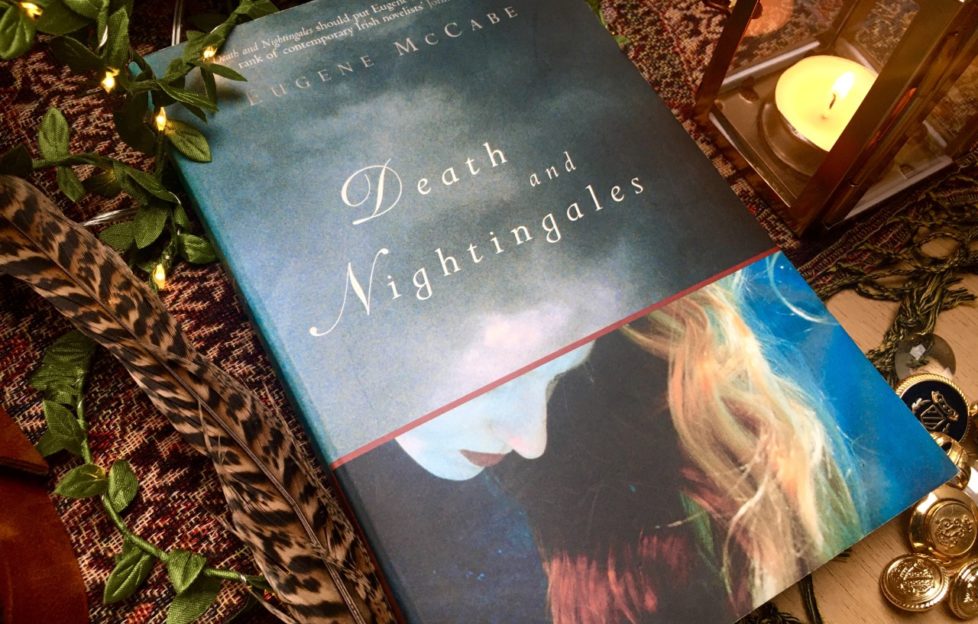
Although it seems hard to believe, we’re already coming into autumn!
I live in the countryside, and with the harvest being taken, and the chilly evenings creeping in, I’m beginning to feel it.
How many of us adjust our reading habits based on weather and season, I wonder?
Maybe you like a nice cosy read when the leaves change? Or do you want something light and enjoyable to dip into on hot summer days?
Personally, I usually read books purely based on what I’m feeling like at any given point. But I do find my choices somewhat influenced by the time of year.
It may be a little clichéd, but I find creepy, ghostly stories particularly fitting fare coming into October — though I’m not quite there yet.
A gateway book into the chillier months
Luckily, “Death and Nightingales” feels like a perfect gateway book into the chillier months.
On the 27th of August, playwright and author Eugene McCabe passed away, aged ninety.
It was by sheer coincidence that I picked up his only novel to re-read recently. But hopefully this review is a fitting tribute to a marvellous Irish writer.
I also had no idea that “Death and Nightingales” was his only novel until now. But that’s all the more reason to recommend it. I think it’s rather an underrated gem.
You may have seen the BBC adaptation of the book in 2018. I personally watched all three episodes of it just after reading the book, and I think the two are very different (and the novel vastly superior!).
If you have seen and enjoyed the series, definitely read the book! If you didn’t enjoy the series, then I think you’d be pleasantly surprised by the source material.
“Love it, hate it, there’s no place like it on earth . . .”
“Death and Nightingales” is a historical novel set on a farm in the bleak marshes of Fermanagh in 1883.
It’s a historical drama but (unlike the TV adaptation!) strays away from melodrama and turns the usual period drama clichés on their heads, weaving a rather more sombre and subtle tale of life in rural Ireland in a time of political and social upheaval in the fall-out of the potato famine.
A prevailing sense of solitude
It is perhaps not a very fun or uplifting read, but it is very well written, with a strange, spooky atmosphere and a prevailing sense of solitude, and darkness.
Beth is a young woman trapped in an impossible situation. Orphaned, and unwed, she lives with her stepfather, Billy Winters.
Billy is a relatively wealthy, yet troubled paternal figure; a protestant who married Beth’s catholic mother, without realising that she was pregnant.
However, after her mother’s passing, Beth has a suspicion that Billy’s intentions towards her might be less than honourable.
Meanwhile, Liam Ward, a handsome neighbour, has caught Beth’s eye — and then some.
Beth makes plans to run away, and begin a new life and family with Liam, far away from the troubled shores of Ireland. She thinks she knows where Billy keeps his money, and Liam promises her a new life in America in exchange for stealing it.
“Tomorrow, I leave it forever.”
What follows is a twisted narrative about history, pain, and betrayal. It unfurls before you, darting through many points of view and skipping around the time line, so as to keep you guessing.
It’s not as overwhelming as it sounds.
It really sticks with you
In actuality, it helps the novel to tackle issues such as the different religious separations and tensions between characters, by granting the reader a feel for the way that not just one family, but rather the whole area are coping with the turmoil, even though the main themes are twisted up around Beth’s storyline.
Although not all of the characters are necessarily “likeable”, their intertwining stories are compelling and fascinating, and the outcomes to the situations that arise are not what you’d expect.
Without spoiling a great read, the storylines come to a conclusion that is particularly stunning.
It is a book which is interested not just with what characters say, but also with what they don’t say. A heavy sense of silence fills the novel, but the unspoken words are well understood.
Whilst the story was grim, and bleak, I felt like it surprisingly manages to steer away from the overplayed elements of Gothic dramas I was expecting, and that made it a much darker and interesting novel to read.
It really sticks with you long after you finish reading.
Although it is a relatively contemporary novel, it is written in a style that echoes older works and classics.
I think anyone who enjoyed “Wuthering Heights” would also enjoy “Death and Nightingales” — and might even find it a compelling companion piece to the Brontë classic.
For more book reviews from the “Friend” team, click here.




